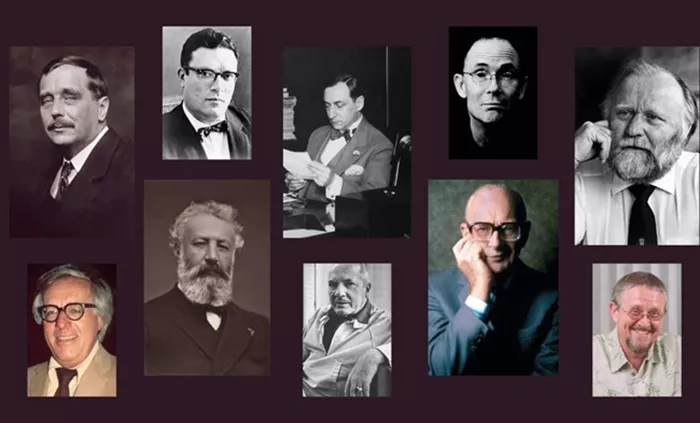Science fiction is one of the most imaginative and thought-provoking literary genres, exploring futuristic worlds, advanced technology, space exploration, artificial intelligence, and the human condition. Over the years, several authors have shaped and defined the genre, captivating readers with their visionary storytelling. Below is a list of ten of the most popular science fiction authors, each with a detailed description of their impact on the genre.
10 Legendary Science Fiction Authors Who Shaped the Future
1. Isaac Asimov (1920–1992)
Isaac Asimov is widely regarded as one of the most influential science fiction writers of all time. His works span multiple subgenres, including hard science fiction and robotics.
Notable Works:
-
Foundation series
-
Robot series (I, Robot)
-
The Gods Themselves
Asimov’s Foundation series explores the rise and fall of civilizations using his concept of “psychohistory,” a mathematical method to predict large-scale future events. His Robot series introduced the Three Laws of Robotics, a set of ethical principles that have influenced both literature and real-world robotics.
2. Arthur C. Clarke (1917–2008)
Arthur C. Clarke was a master of scientifically accurate and visionary science fiction. His collaboration with filmmaker Stanley Kubrick for 2001: A Space Odyssey is legendary.
Notable Works:
-
2001: A Space Odyssey
-
Rendezvous with Rama
-
Childhood’s End
Clarke’s works often explore the mysteries of the universe, human evolution, and the future of technology. His novel Rendezvous with Rama is considered one of the best first-contact stories ever written. Clarke also predicted the development of satellite communications decades before they became a reality.
3. Philip K. Dick (1928–1982)
Philip K. Dick’s stories frequently revolve around themes of identity, reality, and paranoia, often set in dystopian or cyberpunk worlds. His influence extends far beyond literature into films and television.
Notable Works:
-
Do Androids Dream of Electric Sheep? (basis for Blade Runner)
-
The Man in the High Castle
-
Ubik
Dick’s works question the nature of reality and the reliability of human perception. His novel Do Androids Dream of Electric Sheep? inspired the iconic film Blade Runner, while The Man in the High Castle presents an alternate history where the Axis powers won World War II.
4. H.G. Wells (1866–1946)
Known as the “father of science fiction,” H.G. Wells was one of the earliest authors to bring the genre into the mainstream. His works often contain strong social and political messages.
Notable Works:
-
The War of the Worlds
-
The Time Machine
-
The Invisible Man
Wells was a pioneer in exploring the possibilities of time travel, alien invasions, and human invisibility. The War of the Worlds remains one of the most famous alien invasion stories ever written, inspiring countless adaptations and spin-offs.
5. Jules Verne (1828–1905)
Jules Verne is another early pioneer of science fiction, known for his adventure-driven stories that incorporated scientific speculation far ahead of his time.
Notable Works:
-
Twenty Thousand Leagues Under the Sea
-
Journey to the Center of the Earth
-
Around the World in Eighty Days
Verne’s fascination with technology and exploration made his novels both thrilling and scientifically visionary. His depictions of submarines and space travel predated real-world developments by decades.
6. Frank Herbert (1920–1986)
Frank Herbert is best known for Dune, a novel that revolutionized science fiction with its complex themes of politics, ecology, and religion.
Notable Works:
-
Dune series
-
The Dosadi Experiment
-
Destination: Void
The Dune series is often compared to epic fantasy works like The Lord of the Rings, but with a deep focus on human evolution, power struggles, and interstellar ecology. The novel’s influence extends to film, television, and even real-world environmental discussions.
7. Robert A. Heinlein (1907–1988)
Often considered one of the “Big Three” science fiction writers (alongside Asimov and Clarke), Robert A. Heinlein is known for his strong characters and exploration of individualism and freedom.
Notable Works:
-
Stranger in a Strange Land
-
Starship Troopers
-
The Moon is a Harsh Mistress
Heinlein’s novels often tackle political and social themes. Stranger in a Strange Land explores human culture through the eyes of a Martian-raised man, while Starship Troopers presents a military-driven future society.
8. Ursula K. Le Guin (1929–2018)
Ursula K. Le Guin brought a unique philosophical and anthropological perspective to science fiction, challenging gender norms and societal structures.
Notable Works:
-
The Left Hand of Darkness
-
The Dispossessed
-
Rocannon’s World
Her Hainish Cycle series, particularly The Left Hand of Darkness, explores gender fluidity and cultural relativism. She is often praised for her poetic writing style and deep world-building.
9. Ray Bradbury (1920–2012)
Ray Bradbury’s works blend science fiction with poetic prose and deep social critique, making them both timeless and accessible.
Notable Works:
-
Fahrenheit 451
-
The Martian Chronicles
-
Something Wicked This Way Comes
Bradbury’s Fahrenheit 451 is a cautionary tale about censorship and intellectual freedom, while The Martian Chronicles presents a series of interconnected stories about the colonization of Mars. His ability to mix science fiction with human emotion makes his works stand out.
10. William Gibson (Born 1948)
Often credited with pioneering the cyberpunk genre, William Gibson’s works explore the relationship between humans and technology in a hyper-digital world.
Notable Works:
-
Neuromancer
-
Count Zero
-
Mona Lisa Overdrive
His debut novel, Neuromancer, introduced the concept of cyberspace, influencing both literature and real-world discussions on the internet and virtual reality. Gibson’s gritty, high-tech, low-life settings have shaped modern cyberpunk aesthetics.
Conclusion
Science fiction is a vast and ever-evolving genre, and these ten authors have played a crucial role in shaping its history. From exploring artificial intelligence and dystopian societies to imagining the farthest reaches of space, their works continue to inspire new generations of readers, writers, and thinkers.
Each of these authors has left an indelible mark on literature and popular culture, demonstrating that science fiction is not just about futuristic technology—it is also about humanity’s hopes, fears, and potential.

